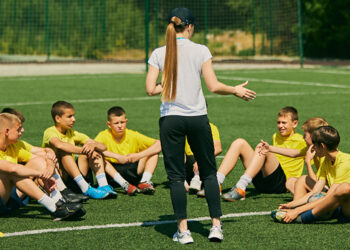Dan Howald of AYSO explains why rec centers should consider soccer programs based on social and emotional learning (SEL).
Watching children engage in soccer is a very fulfilling experience for recreation providers. The physical benefits, the introduction to teamwork in a fun and recreation-first environment, the sheer enjoyment of watching them play validates all the effort, investment and planning to get these programs up and running.
Soccer provides a great pathway to physical literacy, which the Aspen Institute’s seminal Project Play initiative identifies as a key outcome of recreational sport for youth players, giving them the foundation to pursue any number of other sports or activities, including soccer. Yet, there’s so much more we can do to benefit children beyond to the physical aspects.
For example, progressive youth soccer organizations have developed and rallied around curricula that are much more intentional about how to incorporate Social and Emotional Learning (SEL) into their programs. In this way, soccer programs can align with schools, rec centers and other youth-based community development organizations in helping develop the whole child.
SEL-based soccer programs reach beyond the physical and tactical aspects of sport, integrating SEL tools within session training, game management plans and, perhaps most importantly, into coaching education programs. Giving youth coaches an understanding of how to use soccer activities more intentionally as a vehicle to support the non-physical aspects of child development is not just a value-add, it’s a game changer. Players get to learn new life skills and the coaches themselves can tap into a motivation beyond specific sport acumen.
More than a nice idea, SEL-based soccer is an outcome-focused approach with evidence to show it can work. A study published in the Journal of Amateur Sport (Volume 6, Issue No. 1, 2020) documented the implementation of an SEL-based youth soccer curriculum and the benefits gained through participant behaviors in areas such as cooperation, encouraging others and leading and helping others.
Enriching children’s lives by helping them develop competencies such as self-awareness and relationship skills have been shown to be correlated to academic success and overall well-being. Using the great game of soccer as a platform to help our children develop within a well-designed SEL framework, in addition to giving them the opportunity to develop sport-specific skills, is a worthy and achievable goal for recreation program providers everywhere.










